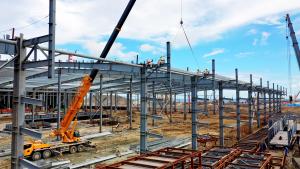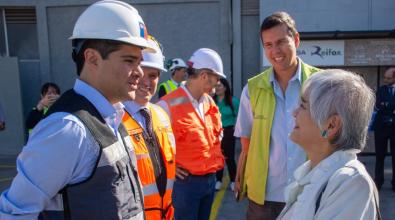Cities take the next step on speeding up approvals residents need

Listen to This Article
Every delayed permit or stalled business license chips away at trust in local government. People rely on their cities to act quickly and effectively, especially when their jobs and quality of life are at stake. Recognizing this, many local leaders are now finding creative ways to speed up approvals, sometimes cutting wait times that once seemed impossible to shorten.
By streamlining these processes, cities aren't just improving efficiency. They're following through on their commitments, rebuilding trust, and proving to residents that local government can respond to their needs.
Setting goals that resonate inside and outside city hall.
Speeding up city workflows often requires setting clear goals for everyone involved and tapping city data to generate buy-in for those goals.
In Philadelphia, where Mayor Cherelle Parker has made affordable housing a top priority, she and her team understand that it takes cooperation from multiple stakeholders, inside and outside city hall, to clear roadblocks that can get in the way of the construction of new developments. That’s why, when delays in neighborhood meetings critical to getting some new projects off the ground were slowing the process down, they decided to use data to keep things moving.
Drawing on skills learned through the Bloomberg Harvard City Leadership Initiative, the team discovered that delays in neighborhood meetings stalled these projects by an average of six months. Armed with this insight, they launched a targeted outreach campaign to community associations, councilmembers, and other key players, using hard numbers to push for quicker action. Their ultimate goal: eliminate delays in at least 75 percent of cases where projects require extra scrutiny.
“To be able to put numbers in those arguments is a big win for us,” explains Ian Hegarty, executive director of the Philadelphia Zoning Board of Adjustment.
Creating incentives for stronger performance.
The private sector has long used money-back guarantees to build trust with customers. Now, cities are building on that approach to hold themselves more accountable to residents.
In Denver, Mayor Mike Johnston has prioritized speeding up the city's building permit process, employing the “tiger team” approach that brings together talent across agencies to quickly tackle longstanding challenges. And one of the most unique elements of the city’s new workflow is the use of time-bound guarantees, sometimes called “shot clocks,” which set explicit deadlines, such as completing permit reviews within 180 days. If the city fails to meet the deadline, applicants are entitled to refunds of up to $10,000. “We’re putting money on the table to show how serious we are,” says Jill Jennings Golich, director of the Denver Permitting Office.
In San Francisco, Mayor Daniel Lurie's new administration is exploring shot clocks of its own. In the meantime, they’ve introduced new dashboards that track each step of the local permitting process, clearly showing residents and businesses how quickly (or slowly) the city is meeting its goals. "It can be uncomfortable to expose when you're not delivering for customers, but we ultimately decided that doing so (and learning from it) was better than just not delivering,” says Chief of Housing and Economic Development Ned Segal.
Anticipating, not reacting.
It’s one thing for the city to move faster when you ask for something, and quite another for the city to get in touch before you even ask. That’s exactly what’s happening in San Diego under Mayor Todd Gloria.
Gloria, too, has placed an emphasis on speeding up building permits. And one way his city is doing so is by monitoring when developers seek certain state tax credits (such as those intended for affordable housing) for their projects. When staff see applications that are connected with local properties, they know that sooner or later, they’re going to receive a building permit application. So rather than wait, they proactively reach out to the developers to get the ball rolling. That helps ensure submitted applications are 100 percent complete and, as a result, don’t gum up city capacity and add needless delays to getting across the line.
In fact, the city is moving so quickly now that some architects are actually declining to participate in the initiative because they’re not sure they can respond in the required 24-48 hours. It’s all part of a larger shift toward proactivity that has the city processing priority building permit applications in an average of eight to 11 business days, far ahead of the mayor’s mandated goal of 30.
“The way that cities usually do permitting is very transactional, and there's no trust in that,” explains Christopher Ackerman-Avila, a policy advisor with the mayor’s office. “What we're trying to do is now make it a more collaborative approach.”
Crowding in expert ideas for what’s next.
Just as the best ideas for new solutions often come from outside city hall, the work of improving internal processes can benefit from tapping external expertise, too.
That’s why, as part of their own participation in the Bloomberg Harvard City Leadership Initiative, leaders in Hamilton, Ontario, spent months working with dozens of outside partners, including developers, landowners, and engineers, to come up with more than 800 ideas for accelerating planning approvals. All of that crowdsourcing is paying off, with two pilots—one for an AI tool that pre-reviews planning applications and another that articulates internal responsibilities around each approval—showing promising results. In fact, the city has already seen a 70 percent decrease in the number of days it takes from when a site plan application is received until it is conditionally approved.
“The experience and the knowledge and the confidence of our team has started to grow,” says Tricia Collingwood, a city official leading this work. “And, crucially, we’ve become more efficient and effective.”


